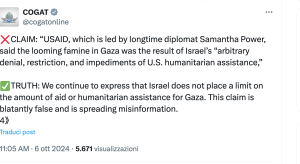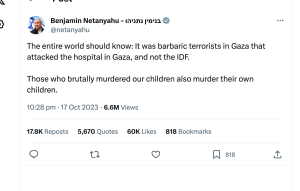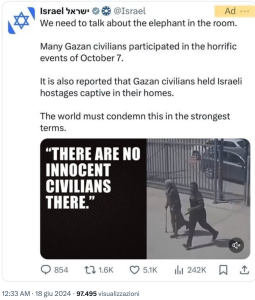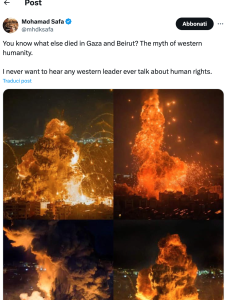“To write poetry after Auschwitz is barbaric,” Theodor Adorno famously declared in a widely cited passage from his Cultural Criticism and Society 1955 essay. This powerful statement by the prominent philosopher, who had to flee Nazi Germany, encapsulates the deep ethical paradox of representing atrocities, even through art. Artistic depictions of pain, as he writes, could “contain, however remotely, the power to elicit enjoyment out of it,” which would diminish its horror and ultimately do an injustice to the victims.
Senegalese writer Boubacar Boris Diop echoes this sentiment recalling his meeting with survivors of the Rwandan genocide. They implored him, “Please don’t turn what we tell you into novels,” fearing that their stories would reduce them to mere characters, stripping away their humanity. Diop shared their concern, noting that “literature can make things more beautiful and more acceptable.” “I think the people we met feared this,” was his bitter conclusion. Similarly, during the Balkan war, David Rieff, paraphrasing his mother Susan Sontag’s masterpiece Regarding the Pain of Others, spoke of the danger of enabling the “voyeurism of others” simply by documenting atrocities and exposing them to the public eye.
Decades later, little has changed regarding the ethical and professional dilemma of whether the ‘pain of others’ should be globally witnessed and represented through audiovisual media. But I am not interested in reflecting upon the painful contradictions of bearing witness to genocide 2.0—the ongoing genocide of the Palestinian people, live-streamed, ‘liked’, shared, and commented upon by millions around the world. Just last June, 50 million people across the planet shared the AI-generated image All Eyes on Rafah, yet the genocide it depicts continues unchecked to this day, highlighting the inconvenient truth that sharing is caring... only to a certain extent.
Instead of focusing on the pain of others, I want to look at the pain of us. Us—the so-called civilized world— and our inability to speak, after Gaza, after Palestine, about so many things that used to define us, that were once inalienably ‘ours’.
To talk about humanism after Gaza is barbaric.
Humanism lacks a single, universally accepted definition, with scholars attributing it varying meanings. Philosopher Sidney Hook describes humanists as those who oppose the imposition of one culture on another, reject organized religion, dictatorships, and violence for social reform, and advocate for the elimination of hunger and improvements in health, housing, and education. Similarly, philosopher H. J. Blackham looks at humanism as a means of improving humanity’s social conditions by promoting autonomy and dignity for all. In common parlance, humanism is a doctrine, attitude, or way of life centered on human interests or values. Merriam Webster uses italics for more emphasis, “especially: a philosophy that (…) stresses an individual’s dignity and worth” . None of these values hold up in the face of Gaza’s annihilation of human and environmental life today.
Humanitarianism fares no better. To talk about humanitarianism after Gaza is barbaric.
At the core of all humanitarian actions, as stated by the UN Refugee Agency, lie the “fundamental principles of humanity, impartiality, neutrality, and independence,” principles rooted in international humanitarian law and embraced by the United Nations through General Assembly Resolutions 46/182 and 58/114 .
The UN has officially declared “full-blown famine” in Northern Gaza . In late April, two leading U.S. authorities on humanitarian assistance concluded that “Israel had deliberately blocked deliveries of food and medicine into Gaza” —a potentially explosive finding, as U.S. law requires halting weapons shipments to countries obstructing humanitarian aid. Samantha Power, longtime war journalist and current head of USAID, emphasized that the famine in Gaza was caused by Israel’s “arbitrary denial, restriction, and impediments of U.S. humanitarian assistance.” Yet, just days after the reports were delivered, the Biden administration cautiously stated, “We do not currently assess that the Israeli government is prohibiting or otherwise restricting the transport or delivery of U.S. humanitarian assistance.”
Thus, bodies disappear—deprived of calories, clean water, and medicine—, and humanitarianism crumbles under such words, while we silently witness the collapse of our values over rotten human flesh.

To talk about human rights after Gaza is barbaric.
Michael Ignatieff, writer and former director of the Carr Center for Human Rights Policy at Harvard University, highlights how the human rights discourse has become “the lingua franca of global moral thought.” This language of human rights has both sparked and resulted from an unprecedented -post World-War II – explosion in institutions, foundational documents like the Universal Declaration of Human Rights (1948), criminal tribunals (Nuremberg, Tokyo, Yugoslavia, Rwanda) and ultimately the establishment of the International Criminal Court. Nobel Peace Prize laureate Elie Wiesel referred to human rights as a worldwide secular religion. Yet this secular religion is now being strangled under the rubbles of Gaza—buried beneath the destroyed buildings, schools, hospitals, shelters, kindergartens, and refugee camps. It lies crushed with Palestine’s women, the elderly, the disabled, the infants, and the unborn children still in their mothers’ wombs.
To speak of humanism, humanitarianism, or human rights after Gaza is barbaric.
This moment may well signal the end of a paradigm, the closing act of an era that reached its height after World War II. As Uzi Baram notices in a Haaretz op-ed, “a new generation of commentators and thinkers has arisen in the wake of October 7. A generation that says, enough with liberal values and human dignity for all. We live in a jungle with different rules.”
This resonates with the conclusions of Mairav Zonszein, senior Israel analyst at the International Crisis Group, who observes that “for years, Israelis have been able—through military and economic domination—to disregard the single most pressing issue facing the country—its control over millions of Palestinians. The shock and trauma inflicted by the Oct. 7 attack opened the floodgates even further on what is considered acceptable.”
Poet Hala Ayan rightly points out that “on October 17, 2023, it was a matter of intense debate whether Israel had bombed al-Ahli hospital, with countless talking heads and representatives rushing prime-time news to speak of self-defense and moral armies” . Forensic Architecture, Human Rights Watch and various international organizations became involved in the battle to verify the audio and video evidence surrounding the incident. At the time, the IDF attributed the attack to Hamas rockets, engaging in a heated struggle over the forensic analysis of the images available. Their website offered a detailed account, including aerial footage, maps, video snippets, and even an excerpt from a phone call recording, which they claimed proved that a Hamas-related group was responsible for the strike . The IDF strongly articulated this narrative, building a body of ‘evidence’ to support their case. Netanyahu in person rushed to make a public statement on X, asserting that “it was barbaric terrorists in Gaza that attacked the hospital in Gaza, and not the IDF.”

A year later, Israel is openly bombing hospitals, UN schools, shelters, refugee camps, and even areas its own government had designated as ‘safe.’ By now, it seems Netanyahu no longer considers bombing civilian and healthcare infrastructure a taboo or an act of barbarism. “The goalpost of what’s acceptable has shifted at breakneck speed,” Ayan bitterly concludes.
Back in 2002, during one of the many wars on Gaza, Israel launched a missile attack on the apartment of Hamas military leader Sheik Salah Shehadeh, killing him along with at least 14 others, including nine children. At the time, the White House condemned the action, stating, “This heavy-handed action does not contribute to peace,” and expressing regret for “the loss of innocent life.” The statement came from a Republican administration led by George W. Bush.
Today, following the assassination of Hezbollah leader Hassan Nasrallah on September 27, during which over 80 bombs were dropped on multiple high-rise apartment buildings, killing and injuring an unconfirmed number of civilians, Democrat Joe Biden offers a notably different response. Biden states: “Hassan Nasrallah and the terrorist group he led, Hezbollah, were responsible for killing hundreds of Americans over a four-decade reign of terror. His death from an Israeli airstrike is a measure of justice for his many victims.” Remarkably absent from his statement was any mention of the civilian casualties or the more than 200,000 displaced Lebanese in the week that followed the attack, according to the United Nations—dismissed, it seems, as a necessary price for achieving this so-called “measure of justice.”
“The body of a Palestinian—a Lebanese, or any ‘disposable’ person in the world—is a negotiable thing: when they are shredded, burned, lynched, assaulted, (…) we are conditioned to accept their fate as inevitable,” writes Hala Ayan. Director Ghassan Salhab echoes from his Instagram feed: “Each time we wake up, we repeat to ourselves that there are no more words to describe this bloodthirsty enemy and his infamous accomplices. The gates to the horror proper to mankind are wide open”.
“At the risk of arousing the resentment of my colored brothers, I will say that the Black is not a man,” wrote Fanon in his seminal work Black Skin, White Masks. How could we argue otherwise, when mass slaughter unfolds in full pixels before our eyes? Palestinian, Lebanese, Arab lives, it seems, are not deemed as grievable as others. They cannot be mourned, as Judith Butler contends , because they have never been recognized as life in the first place.
Disturbing, isn’t it, Western-educated reader? You, us, raised with the values of dignity, human rights, and the belief that all humans are equal before the law. Yet Israel’s far-right finance minister, Bezalel Smotrich, has the audacity to casually declare to the ‘civilized’ West that it may be “justified” for his country to starve two million Palestinians to death—but adds, “the world won’t allow it.” Well, not this month. Not yet.
Hospitals are not hospitals. Schools are not schools. Homes are not homes.
Too much dehumanization has taken place, and for so long in the case of the Palestinian people, that Israeli officials can openly say such things, releasing them publicly without fear, in complete defiance of any common sense or shared notion of humanity and dignity. “There are no innocent civilians there,” as a widely accepted narrative solemnly declares. This process began long ago, as Edward Said pointed out in his Open Letter to American Jewish Intellectuals. Arabs, he wrote, were portrayed as “faceless (…), murderers, enemies, subject to a whole gamut of unattractive, automatically and ceaselessly repeated deformations (irrationality, fanaticism, misanthropy, unadulterated barbarism).” “Always it was our negative features that allowed Israel’s intellectual apologists to set us off against, in order then to underscore, Israeli liberalism, democracy, enlightenment, etc.,” he concluded. And this was in 1989.

Now, in 2024, a Lebanese friend who lives in Europe writes to me: “I know that I don’t matter, here or there. I am collateral damage”. How could I possibly respond to such a clear and painful analysis of the situation? Now, in 2024, it is no longer just a matter of Israel and Palestine, nor solely about how Israeli officials and its citizens openly and publicly dehumanize Palestinian, Lebanese, Arab lives in general. It has become a matter of us—the so-called civilized world. Why do we permit such language and actions to continue? Why do we turn a blind eye to such blatant assertions of life hierarchies? “Israel has the right to self-defense” is the mantra we have all heard repeatedly since the Hamas massacre on October 7, 2023.
Yet, as philosopher Elsa Dorlin argues in her powerful book Self Defense: A Philosophy of Violence, “the very possibility of defending oneself is the exclusive privilege of a dominant minority”. Dorlin traces this concept back to the roots of American history, where self-defense was framed as a ‘natural’ and inalienable right based on the right to property—whether of land or of unprivileged bodies, like white women or black slaves. Only those with possession have the right to defend, which reflects Israel’s claim to defend its ‘property,’ the land, while subjugating or annihilating its people, the Palestinians. ‘Self-defense’ becomes a justification for revenge and collective punishment of entire populations (Palestinians, Lebanese, and now Iranians are threatened), with none of us civilized nations stepping in to stop the slaughter. Our silence in the face of these crimes is excused and ‘legitimized’ by the very ‘liberal’ values we claim to uphold—like self-defense, which, as Dorlin points out, lies at the core of U.S. rhetoric and identity, constituting a pillar of Western ‘civilization’.

Buried beneath the racial and colonial legacy that supports and justifies Israel’s contemporary settler colonialism and its all-out war, lies the language we once prided ourselves on: humanism, humanitarianism, human rights, humanity. The ‘h’ language is barbaric after Gaza.
The mask has fallen, revealing that this very language has always been used to justify, as Nina Power notices, “white expropriation under the guise of an inclusive exclusion that reinforced racial hierarchies and inequalities .”
Under the guise of the ‘h’ language, a hierarchy of lives worth living has been established, where the conventional life/death opposition has been revised through a more sophisticated mechanism of biopower—one that includes those condemned to “slow death.” Jasbir Puar offers a poignant analysis of this condition in The Right to Maim, examining how Israel has operated in Palestine, particularly in Gaza, for decades. This “will-not-let-die” doctrine functions on two levels: maiming human bodies and maiming infrastructure. Israel effectively turns able-bodied people into the disabled by controlling life-sustaining resources like water, electricity, medical supplies, and even calories. According to Puar, this tactic is designed to keep the official death toll low while still depopulating the territory, as those who die from injuries years later won’t be counted as war deaths. Israeli linguist Tanya Reinhart observed this technique during the second intifada, referring to it as a “policy of injuries,” noting how the creation of disability had become a military strategy: “Specially trained Israeli units shoot in a calculated manner to cripple [sic], keeping Palestinian death statistics low while ensuring long-term suffering.”
As if to officially welcome the new stage of humanity where the ‘h’ language no longer holds any weight, Netanyahu’s latest military operation against Lebanon was named the New Order. In this new order, in this regime of brutalism, the ones who suffer the most are us civilians—defenseless and vulnerable in the face of power’s supposed right to ‘defend itself.’ “It’s the jungle… the new order where it’s just out in the open that those with power can do whatever they want,” writer Susan Abulhawa denounces in a chilling Al Jazeera documentary on Gaza crimes . Paradoxically—but not coincidentally, I suspect—the term ‘New Order’ resonates ominously with Hitler’s Neuordnung, the vision of a pan-German racial state shaped by Nazi ideology.
This new order will not be confined to Palestine or the Middle East. It signals the end of a paradigm and the beginning of another, one where us so-called ‘civilized’ nations will openly accept and embrace the jungle, discarding the values, ideas, laws, and rights we were raised with into the garbage of history.
To simply talk, after Gaza, will be barbaric—unless we speak out now.


